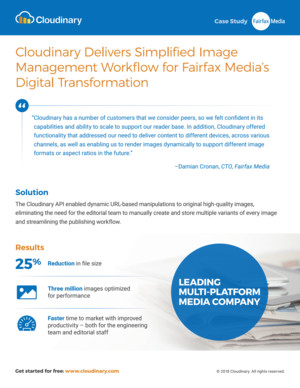Fairfax Media Limited [ASX:FXJ] is one of the largest media companies in Australia and New Zealand that engages audiences and communities via print and digital media. It includes recognizable mastheads including The Australian Financial Review, The Sydney Morning Herald and The Age. Fairfax Media operates numerous news and information websites, as well as tablet and smartphone apps, for online news sites.
In 2016, Fairfax Media began a wide-ranging digital transformation of its news organization, which included streamlining image management and delivery workflow.
An efficient publishing workflow is key for journalists at Fairfax Media, who are responsible for posting articles, including supporting assets, such as imagery. Historically, a lot of production time was spent transforming images to ensure they are optimized for different target devices and formats for the audience. This process was frustrating because it took valuable time from their core reporting, writing and editing duties.
| “Image management was always a headache because our systems didn’t scale to support our growth, image processing was slow, and it was difficult to add modern formats and functionalities to meet today’s needs,” said Damian Cronan, Fairfax Media’s CTO. “As we undertook the digitization project, we knew we needed to address the challenges our editorial team faced with images, and started exploring a variety of options.” |
The team initially considered developing its own in-house image management solution, but Cronan conceded that “there’s a level of sophistication in getting it right and our engineering time was scarce and valuable. For us, it was a better business decision to outsource these tasks to a commercial partner because it would give us a jumpstart in getting to market.”
| Fairfax Media evaluated solutions from a number of content delivery networks and image optimization solutions, ultimately selecting Cloudinary. “Cloudinary has a number of customers that we consider peers, so we felt confident in its capabilities and ability to scale to support our reader base,” Cronan noted. “In addition, Cloudinary offered functionality that addressed our need to deliver content to different devices, across various channels, as well as enabling us to render images dynamically to support different image formats or aspect ratios in the future.” |
Before Cloudinary, editors had to edit and crop images using an outdated image transformation tool, which was a time-consuming part of their daily tasks.The Cloudinary API enabled dynamic URL-based transformations to original high-quality images, eliminating the need for the editorial team to create and store multiple variants of every image and, streamlining the publishing workflow.
| “The workflow we built with Cloudinary is much more user friendly than previous processes,” Cronan said. “Our editors with the *Brisbane Times*, who were the first to use it, told us that their experience was efficient and smooth, leaps and bounds ahead of how they used to deal with images.” |
One of the most useful Cloudinary features for Fairfax Media is automatic, content-aware cropping, which ensures that the point of interest is consistently maintained regardless of viewport or layout of the viewing device. In addition, Cloudinary’s capabilities for supporting responsive images ensures that they are displayed appropriately across all devices and screens with minimal effort. This feature yields crucial performance improvements by delivering the optimal version of the image based on the content and viewing context.
Fairfax Media also relies on Cloudinary’s image optimization features, which enable them to deliver browser-specific formats and adjust the perceptual quality to reduce load times without any visual degradation. These features support delivery of images that look good and load fast. “With Cloudinary we achieved better image quality overall, compared to its competitors, with an ideal trade off between quality and file size,” Cronan added.
Fairfax Media initially began testing Cloudinary in June 2017, and was immediately impressed with how quickly they could get the solution up and running, then scale to support significant volumes of images. Fairfax Media currently has approximately 3 million images under management with Cloudinary.
The Brisbane Times was the first online property to integrate Cloudinary into its WordPress implementation. After a successful pilot deployment there, Cloudinary was deployed for all other Australian metropolitan mastheads over the course of about eight months, concluding in February 2018. Now as much as 90 percent of Fairfax Media’s network is benefiting from Cloudinary image management capabilities.
In early results, Fairfax Media has seen up to a 25 percent reduction in file size. But more important, perhaps, is the improved productivity – both for the engineering team and editorial staff.
| “We’ve had a very positive experience with Cloudinary,” Cronan concluded. “The best SaaS products are the ones we don’t have to think about because they just work and allow us to focus on other critical priorities.” |

